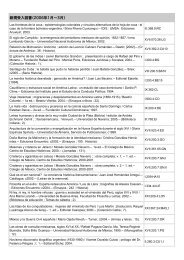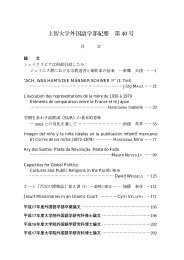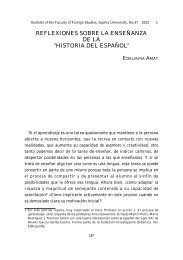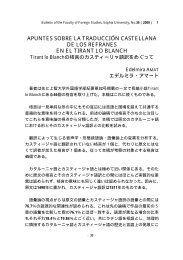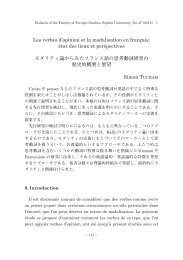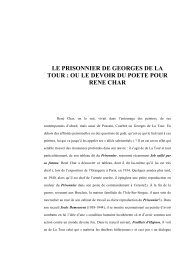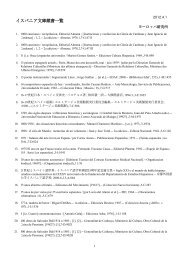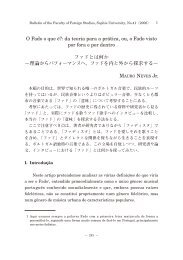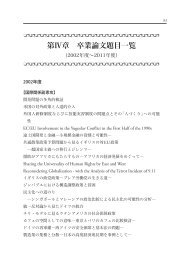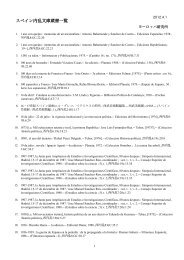Forgotten Paths to NEPA: A Historical Analysis of the Early ...
Forgotten Paths to NEPA: A Historical Analysis of the Early ...
Forgotten Paths to NEPA: A Historical Analysis of the Early ...
You also want an ePaper? Increase the reach of your titles
YUMPU automatically turns print PDFs into web optimized ePapers that Google loves.
Joseph DiMen<strong>to</strong> and Kazu<strong>to</strong> Oshio<br />
The rapidity <strong>of</strong> change and <strong>the</strong> speed with which new situations are created<br />
follow <strong>the</strong> impetuous and heedless pace <strong>of</strong> man ra<strong>the</strong>r than <strong>the</strong> deliberate<br />
pace <strong>of</strong> nature. Radiation is no longer merely <strong>the</strong> background radiation <strong>of</strong><br />
rocks, <strong>the</strong> bombardment <strong>of</strong> cosmic rays, <strong>the</strong> ultraviolet <strong>of</strong> <strong>the</strong> sun that have<br />
existed before <strong>the</strong>re was any life on earth; radiation is now <strong>the</strong> unnatural<br />
creation <strong>of</strong> man’s tampering with <strong>the</strong> a<strong>to</strong>m. The chemicals <strong>to</strong> which life is<br />
asked <strong>to</strong> make its adjustment are no longer merely <strong>the</strong> calcium and silica and<br />
copper and all <strong>the</strong> rest <strong>of</strong> <strong>the</strong> minerals washed out <strong>of</strong> <strong>the</strong> rocks and carried in<br />
rivers <strong>to</strong> <strong>the</strong> sea; <strong>the</strong>y are <strong>the</strong> syn<strong>the</strong>tic creations <strong>of</strong> man’s inventive mind,<br />
brewed in his labora<strong>to</strong>ries, and having no counterparts in nature. 21<br />
In <strong>the</strong> following year, President John F. Kennedy helped <strong>to</strong> alert Americans <strong>to</strong> <strong>the</strong><br />
environmental crisis through his persuasive introduction <strong>to</strong> Stewart Udall’s important<br />
book The Quiet Crisis:<br />
The his<strong>to</strong>ry <strong>of</strong> America is, more than that <strong>of</strong> most nations, <strong>the</strong> his<strong>to</strong>ry <strong>of</strong><br />
man confronted by nature. Our s<strong>to</strong>ry has been peculiarly <strong>the</strong> s<strong>to</strong>ry <strong>of</strong> man<br />
and <strong>the</strong> land, man and <strong>the</strong> forests, man and <strong>the</strong> plains, man and water, man<br />
and resources. It has been <strong>the</strong> s<strong>to</strong>ry <strong>of</strong> rich and varied natural heritage<br />
shaping American institutions and American values; and it has been equally<br />
<strong>the</strong> s<strong>to</strong>ry <strong>of</strong> Americans seizing, using, squandering and, belatedly, protecting<br />
and developing that heritage. In telling this s<strong>to</strong>ry and giving this central<br />
<strong>the</strong>me <strong>of</strong> American his<strong>to</strong>ry its proper emphasis and dignity, Secretary [<strong>of</strong><br />
<strong>the</strong> Interior Stewart] Udall puts us all in his debt. 22<br />
Kennedy’s assessment pointed <strong>to</strong> declining environmental standards and stressed<br />
<strong>the</strong> need for an expansion <strong>of</strong> <strong>the</strong> concept <strong>of</strong> conservation <strong>to</strong> meet <strong>the</strong> crisis:<br />
The modern American record in conservation has been brilliant and distinguished.<br />
It has inspired comparable efforts all around <strong>the</strong> earth. But it came<br />
just in time in our own land. And, as Mr. Udall’s vivid narrative makes clear,<br />
<strong>the</strong> race between education and erosion, between wisdom and waste, has<br />
not run its course. . . . The crisis may be quiet, but it is urgent. We must do<br />
in our own day what Theodore Roosevelt did sixty years ago and Franklin<br />
Roosevelt thirty years ago: we must expand <strong>the</strong> concept <strong>of</strong> conservation <strong>to</strong><br />
meet <strong>the</strong> imperious problems <strong>of</strong> <strong>the</strong> new age. We must develop new instru-<br />
25



